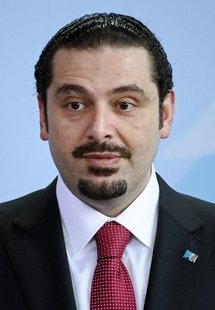
Lebanese Prime Minister Saad Hariri
"Prime Minister Hariri will be seeking guarantees from Washington against any new Israeli adventure in Lebanon," said Osama Safa, head of the Beirut-based Lebanese Centre for Policy Studies.
"He will be ensuring that the red light imposed by the US on Israel continues and will be looking for security guarantees."
In recent months Israel has repeatedly accused Syria of arming Hezbollah with Scud missiles and other weaponry, and warned than in the event of a new conflict it will consider Lebanon, rather than just Hezbollah, as its enemy.
The threats have sparked war jitters and prompted a flurry of diplomatic activity to ease tensions in the region.
Hezbollah, which fought a devastating war with Israel in 2006 and is blacklisted by Washington as a terrorist organisation, has two ministers in the cabinet and is the only faction that refused to disarm following the 1975-1990 civil war.
The Shiite militant group, which is strongly backed by both Iran and Syria, claims its weapons are needed to defend Lebanon against Israeli aggression.
Nabil Bou Monsef, a senior diplomatic analyst at the Arabic-language daily An-Nahar, said Hariri's message to the US authorities will be that a new conflict with Israel will bury any chance for peace in the Middle East.
"He is going to tell the Americans that any Israeli military operation will ruin peace prospects, encourage fanaticism... and no one has any interest in seeing this happen," he said.
Apart from meeting Obama on Monday, Hariri will also hold talks with other US officials as well as the head of the International Monetary Fund, a government official told AFP.
On Wednesday he is due to address the UN Security Council, which is currently chaired by Lebanon.
Bou Monsef said Hariri's visit will be an opportunity for the 40-year-old premier to establish his credentials with the Obama administration.
"He is trying to establish a balance in Lebanon's relations with the United States as well as Syria," he said. "He doesn't want to anger the Syrians, nor does he want to lose American support."
Syria was the main power broker in Lebanon until April 2005, when it was forced to withdraw its troops from the tiny Mediterranean country amid outrage over the assassination of Hariri's father, Rafiq Hariri, in a massive bombing.
Damascus has denied accusations of involvement in the killing.
Lebanon and Syria established diplomatic relations only last year, and Hariri has since visited Damascus twice, most recently on Tuesday.
In recent weeks Hariri has also met a number of Arab leaders, and is expected to convey their regional concerns to US officials.
Safa said that while Washington may seek to allay Arab fears of a renewed conflict in the region, it is also likely to demand that Lebanon subdue Hezbollah and curb weapons smuggling along the border with Syria.
"I don't think the US administration is in a position to give (Hariri) any guarantees... but it will certainly make some demands," he said.
-------------------------------------------------------------------------------
"He will be ensuring that the red light imposed by the US on Israel continues and will be looking for security guarantees."
In recent months Israel has repeatedly accused Syria of arming Hezbollah with Scud missiles and other weaponry, and warned than in the event of a new conflict it will consider Lebanon, rather than just Hezbollah, as its enemy.
The threats have sparked war jitters and prompted a flurry of diplomatic activity to ease tensions in the region.
Hezbollah, which fought a devastating war with Israel in 2006 and is blacklisted by Washington as a terrorist organisation, has two ministers in the cabinet and is the only faction that refused to disarm following the 1975-1990 civil war.
The Shiite militant group, which is strongly backed by both Iran and Syria, claims its weapons are needed to defend Lebanon against Israeli aggression.
Nabil Bou Monsef, a senior diplomatic analyst at the Arabic-language daily An-Nahar, said Hariri's message to the US authorities will be that a new conflict with Israel will bury any chance for peace in the Middle East.
"He is going to tell the Americans that any Israeli military operation will ruin peace prospects, encourage fanaticism... and no one has any interest in seeing this happen," he said.
Apart from meeting Obama on Monday, Hariri will also hold talks with other US officials as well as the head of the International Monetary Fund, a government official told AFP.
On Wednesday he is due to address the UN Security Council, which is currently chaired by Lebanon.
Bou Monsef said Hariri's visit will be an opportunity for the 40-year-old premier to establish his credentials with the Obama administration.
"He is trying to establish a balance in Lebanon's relations with the United States as well as Syria," he said. "He doesn't want to anger the Syrians, nor does he want to lose American support."
Syria was the main power broker in Lebanon until April 2005, when it was forced to withdraw its troops from the tiny Mediterranean country amid outrage over the assassination of Hariri's father, Rafiq Hariri, in a massive bombing.
Damascus has denied accusations of involvement in the killing.
Lebanon and Syria established diplomatic relations only last year, and Hariri has since visited Damascus twice, most recently on Tuesday.
In recent weeks Hariri has also met a number of Arab leaders, and is expected to convey their regional concerns to US officials.
Safa said that while Washington may seek to allay Arab fears of a renewed conflict in the region, it is also likely to demand that Lebanon subdue Hezbollah and curb weapons smuggling along the border with Syria.
"I don't think the US administration is in a position to give (Hariri) any guarantees... but it will certainly make some demands," he said.
-------------------------------------------------------------------------------









 Home
Home Politics
Politics









